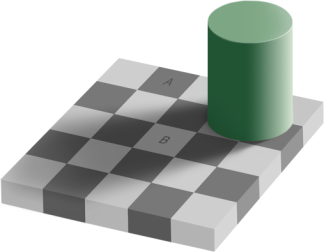Are squares A and B are the same color?

I found this illusion on John Baez’s site. It was created by Edward Adelson in 1995 and is the subject of a Wikipedia article.
Related post: Optical illusion, mathematical illusion
Are squares A and B are the same color?

I found this illusion on John Baez’s site. It was created by Edward Adelson in 1995 and is the subject of a Wikipedia article.
Related post: Optical illusion, mathematical illusion
Comments are closed.
They look different to me, but I’m sure you’re going to tell me I’m wrong !
Amazing.
Yep, they’re the same. I had to open it up in an image editor and drag a little patch from one square over to the other to convince myself that the colors really are the same.
Wow, that’s amazing! Just goes to show a lot of what we see is inferred by the brain and “filled in”. The retinal blind spot’s a good example!
Our brains see the realistic lighting and use it to infer the surface properties of the materials on the board; when asked if the squares are the same color, we answer no. If we were given the actual physical chessboard and threw away the cylinder, clearly the paint on the two squares would in fact be different colored paint.
I’ve never seen anyone address the fact that the “trick” is really based on the loose semantics of the question “Are they the same color?” Our brains have adapted to deal with the real world around us and not gimmicks in photographs, so if that really were a physical chessboard, then those squares really would have to be painted with different colored paint. We are sort of being asked two different questions and getting penalized for answering the wrong question. Great illusion.
I find I can see it if I defocus my eyes. Interestingly, I use the same technique when looking at a scene I’m considering painting. When you know something is a ‘happy little tree’ you end up painting an icon of a tree, not the tree you’re looking at. Of course, if that’s the look and feel you’re going for, it can be quite successful… think Grandma Moses…but the end result is more about your perception of the scene than the scene.